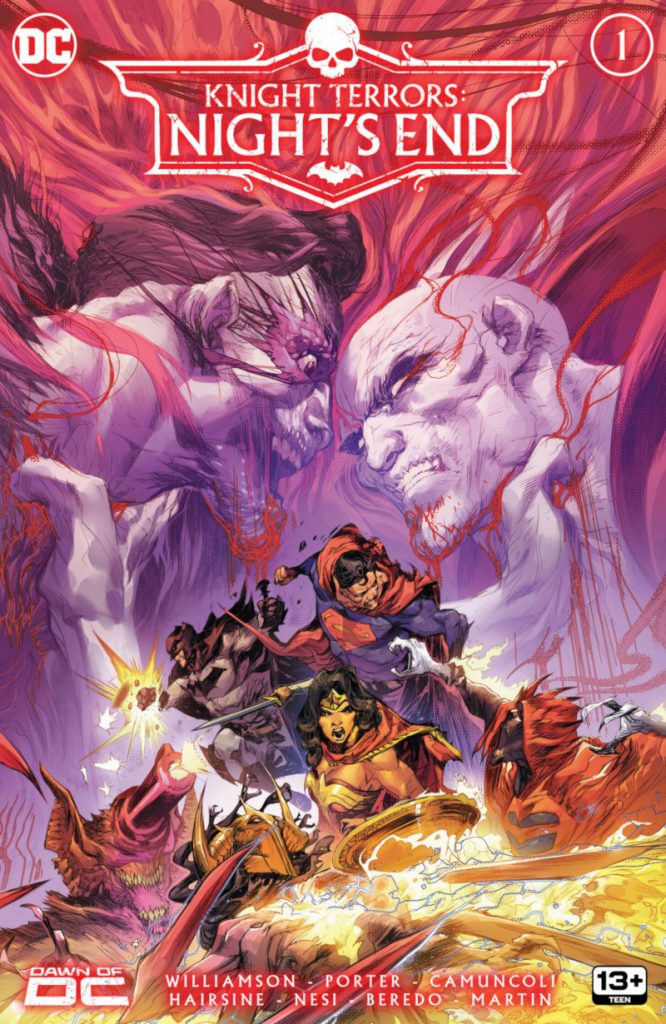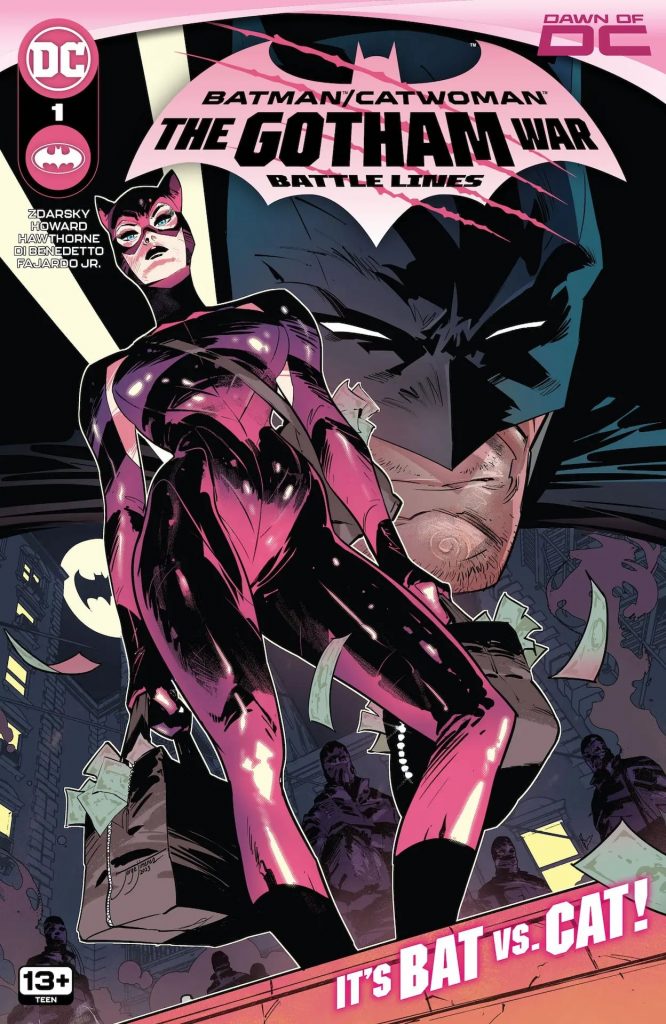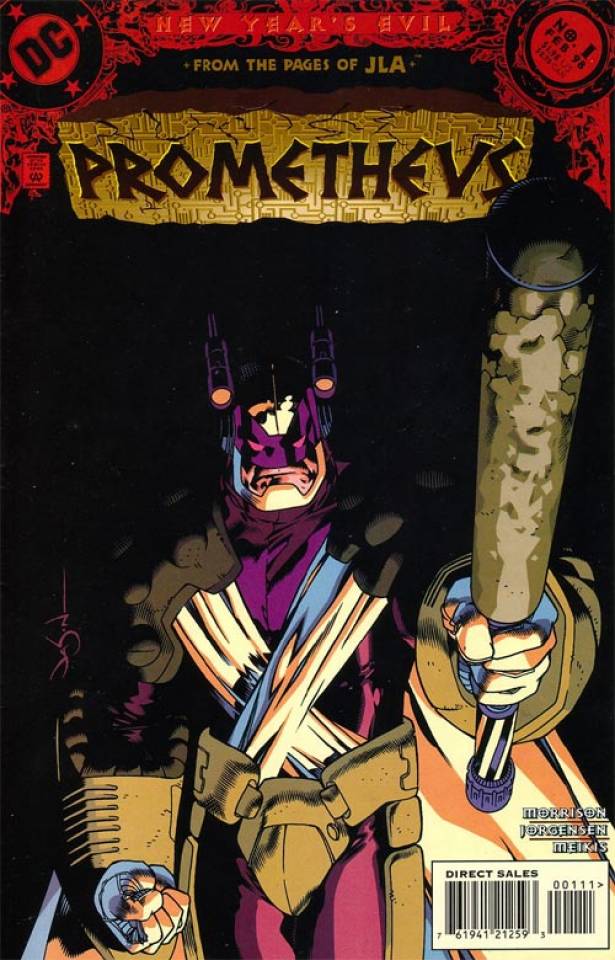A Fifth Week Feature About Fifth Weeks
Fifth Weeks are one of my favorite random curiosities of comics. Let's talk about them.
229.
That’s how many times I’ve written The Pull, the column where I highlight my buys, recommendations, and curiosities from the week’s comic releases. If you do anything that many times, you start to get a feel for the rhythm of something. Maybe that’s related to consistency, or it could be about recognizing when something is unusual relative to the rest. Whatever it is, you develop a sense of the natural state of things after putting in that many reps — even something as all over the place as looking at comic release schedules.
And after 229 of those columns, one thing has become abundantly clear: Fifth Weeks are weird as heck.
What’s a Fifth Week, you might be wondering? That’s simple. Fifth Weeks 1 are when a month has five release weeks for direct market comics. That’s the case this month, as August features five Tuesdays and Wednesdays. Fifth Weeks happen once a quarter, so they’re not uncommon. But they can lead to strange slates, ones loaded with annuals, pop-up events, or one-shots, and often atypical ones at that.
That’s why I’ve always been so curious about them. If the first four weeks of a five week month are meals made to a precise recipe, delicious in all the ways we want them to be, then a Fifth Week can seem like a stew made of random ingredients at times. Sometimes that results in unexpectedly great flavor; other times you’re left bewildered, even if the components still intrigue.
These weeks are also not new. They’ve existed for decades, with DC in particular being famous for Fifth Week events — stories designed to brew up interest in visiting a comic shop during these oddball weeks — that date back to the 1990s. They also exist for a good reason, beyond simply being another week in the year. According to ICv2’s Milton Griepp, 2 Fifth Weeks are rooted in how the direct market and publishers within it operate.
“(Fifth Weeks) are a thing because comics used to be ongoing monthly periodicals with regular frequency and predictable releases, which built customer frequency and loyalty,” Griepp shared. “So, each title had its regular week of release each month and was predictably available the same week each month.”
“But one month every quarter, there was an extra week on the calendar that didn’t fit in that schedule,” he added. “There are 13 weeks in a quarter, and rather than putting out 13 issues a year by just starting the next month in that fifth week, publishers maintained their consistent release schedule, and just skipped putting out new releases in that extra week four times a year.”
That’s right. Once upon a time, or more specifically from 1978 to 1985 per Comichron’s John Jackson Miller, there would be one week a quarter when both DC and Marvel would have no new comics at shops. 3 This wasn’t always at the same time, either, as the Big Two’s schedules were out of sync with one another. But it was still a thing.
Publishers had set schedules where each title was slated into a different quadrant. When a month had a Fifth Week, there was nothing left to publish. Miller described it as a “natural consequence of publishing’s reliance on monthly publications and on standardizing deadlines,” as that quartered approach allowed everyone in the publishing chain — editorial, shops, advertisers, etc. — to have one date to aim for each month. It was simpler, but it had a massive issue at its core: the top selling publishers had an empty week of releases each quarter!
So, publishers found solutions to this problem. One of those were the aforementioned Fifth Week events. Depending on who you ask, those either began with 1995’s Superman: Man of Tomorrow, 4 the Amalgam Comics that were born from merging two universes in the DC vs. Marvel crossover in 1996, 5 or 1998’s New Year’s Evil, 6 a series of one-shots focused on DC villains. These events ensured that shops had comics to sell on these weeks. But they had a secondary benefit, according to Marvel’s Executive Editor Tom Brevoort, in that it would allow for a publisher’s regular titles to stay just that — regular.
“The idea of a ‘fifth week event’ initially was to ship more product to stores during a month that contained five release dates instead of four,” Brevoort told me. “At the earliest times of this approach, the notion was that you’d do a special event, a flight of books that would all ship to stores during that one extra week, and so not disrupt the monthly planning of your ongoing titles.”
This of course added work because it meant creating completely new material. But it also offered freedom for the Fifth Week titles and space for the others to have an unfettered existence. It was a smart solution to a quirky problem.
Over time, though, the idea of what could and should be released on one of these weeks expanded. Fifth Weeks became a home for one-shots and annuals, amongst other things. Sometimes they were regular titles. Other times they were titles specifically designed for these weeks. Either way, the goal of these releases was one and the same: to get customers to comic shops on a week that previously gave them little reason to do so.
These days, though, the idea of a Fifth Week has changed, just like the direct market itself has. As Miller told me, it’s “easier to be flexible with scheduling and expand out into the fifth week.” With advertising being less of a focus and the newsstand off the table, rigidity in scheduling is less important. More than that, Griepp noted that the rise of “one-shots, miniseries, graphic novels, and other publications that don’t fit (the) 12 issues a year pattern” led to these weeks no longer needing to be handled differently than other weeks. 7


That said, it’s undeniable that Fifth Weeks are still a factor. Even if you just take a quick look at this week’s release list — which, again, is a Fifth Week — you’ll see that some publishers are using these weeks like before, even if they aren’t a necessity anymore. DC’s slate stands out in that regard, as it’s laden with one-shots, including Gnort’s Illustrated Swimsuit Edition #1, Action Comics Presents Doomsday Special #1, and the opening and close of big stories in Batman/Catwoman: Gotham War – Battle Lines #1 and Knight Terrors: Night’s End #1 respectively. 8
In conversations with folks at the Big Two, it’s clear that Fifth Weeks are still considered, even if it isn’t always the same playbook as before. It is pretty similar at DC, though, and that last note about launching and concluding events is a key one.
Someone with knowledge of DC’s approach told me Fifth Weeks are something that’s planned for well in advance. This can result in a variety of approaches. At the top were those weeks acting as the beginning or ending of an event, as it gives you space to offer an alpha or omega story leading into other titles in the weeks that follow. While the focus is on one-shots, annuals, and specials, what they offer events and crossovers is crucial, and those typically come in a similar form.
DC also noted on its site that Fifth Weeks are the reason for its quarterly anthologies, like the aforementioned Gnort’s Illustrated Swimsuit Edition. Given the regular cadence of these weeks, a seasonal approach is smart. It’s just leaning into rhythms that already exist. But that goes to show that these weeks don’t just impact scheduling at DC; they result in the creation of new material altogether.
That isn’t necessarily the case for Marvel. For the House of Ideas, it’s less about creating special releases and more about spreading the wealth, per Brevoort, even if they are able to go a bit deeper in months with five weeks.
“We deal with them differently than we did in the past, but the underlying concept is the same: since there are five weeks in which to ship books rather than four, we tend to go heavier on our release schedule for (a) five-week month than a typical four-week month,” Brevoort shared. “Over time, we’ve found that it makes greater sense to ‘load-balance’ our releases across the entirety of the month, so we’re not shipping a week’s worth of books without any Marvel perennial titles in it—the titles that help to bring regular customers into the stores.”
That’s smart. Doing that ensures consumer cadences aren’t broken. Having regular titles like Ultimate Invasion or Wolverine hit on a Fifth Week draws comic shop customers in, helping prevent skip weeks amongst regulars. This also keeps things steady for the publisher itself. Because of their approach, and due to the predictable regularity of these weeks, “dealing with (Fifth Weeks) has become rote” for Marvel, according to Brevoort.
Fifth Weeks are a bigger deal for the Big Two than other publishers, if only because they have larger slates than the rest. But they’re a factor elsewhere, in ways that vary by publisher. For example, Vault’s CEO & Publisher Damian Wassel told me these weeks allow them to “spread out trade paperbacks or later issues of continuing series to give higher profile launches more breathing room.” While they don’t “adopt any particular systematic treatment” to these weeks, they do offer necessary space at times.
Skybound’s Senior Vice President/Editor-in-Chief Sean Mackiewicz also mentioned “breathing room” as part of the appeal, but mostly in that Fifth Weeks give his team extra time to “get key tasks done and prep for next week’s deadlines” if they don’t have any releases that week. That isn’t always the case, though. Skybound likes to use these to “release a collection, hardcover, original graphic novel, or special project” or even “spotlight a single title,” if only because the leaner release lists makes that light a little brighter. Fifth Weeks can even offer relief to titles that are running late, affording creators and the company the ability to get an issue out without breaking the monthly schedule. There’s a lot of advantages to them, even if they don’t always result in new material.
Some other publishers do use Fifth Weeks to launch special releases like DC does, though. According to Bryce Carlson, BOOM! Studios’ VP of Editorial & Creative Strategy, the company plans for these weeks “years in advance.” In the direct market, the publisher likes to use them to “publish additional releases without overloading the standard four week schedule.” This week’s Mighty Morphin Power Rangers 30th Anniversary Special #1 is a good example.
They also allow BOOM! to “easily add in an event storyline tie-in special to help broaden the scope of the overall story and do so without having to impact the regular release cadence or stretch out how many months the event is planned for,” which is a real plus. There are other benefits, of course. Carlson echoed Mackiewicz’s take that this gives space in case deadlines slip. It also allows them to “better balance the overall schedule of collection releases.” This is why Fifth Weeks aren’t off weeks at BOOM!, but ones that are as crucial as the rest.
Whichever publisher you’re talking about, though, Fifth Weeks continue to be a factor, even if the reasons for that have changed over the years. They’ve just become a part of the rhythm of direct market comics, as regular as any other week, even if some publishers do create special material just for the occasion. But from the reader side, I can say this: They remain a curiosity, and one that always adds a little flavor to the week’s releases when they hit — even if it can be a funky one.
Which I will only refer to with both words capitalized, because they’re so weird it’s how I refer to them.↩
Someone who has decades of experience in the direct market, including co-founding and acting as the CEO of Capital City Distribution, a comic distributor that once was one of the biggest in the industry before Diamond Comic Distributors took over in the 1990s.↩
Miller told me that Marvel’s stretch was actually longer, as it ran from 1974 to 1987. This is just when they both had a skip week baked in.↩
That earns my vote.↩
Miller described that as the “real first” December fifth week event.↩
Don’t sleep on the impact of line-wide events, either. When Fifth Weeks were born, sprawling events that last for months at a time were not as much of a thing.↩
You can see it with other publishers too, namely IDW’s Endless Summer one-shots, BOOM!’s Mighty Morphin Power Rangers 30th Anniversary Special #1, and Marvel dropping Marvel Age #1000 this week. It’s just DC is the most committed to the idea.↩


